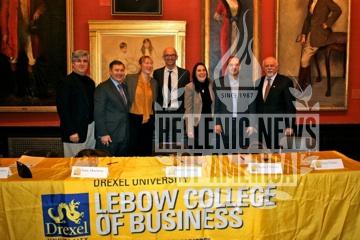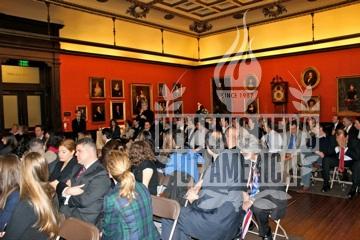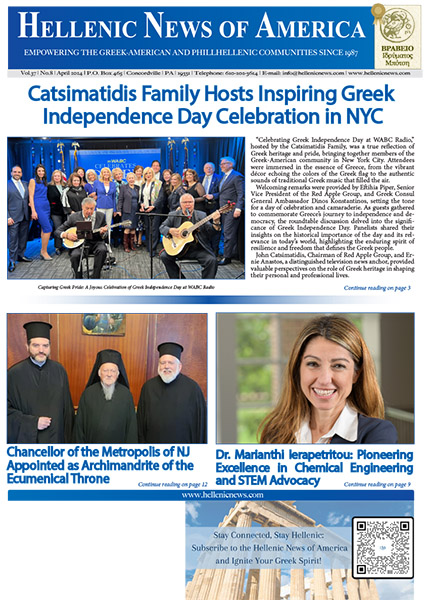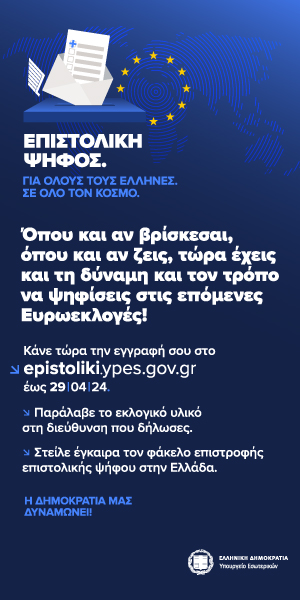
By Dimitri Soultogiannis and Eva-Iro Soultogiannis
Special to the Hellenic News of America
Philadelphia, PA—On Wednesday, February 29th 2012 the Hermes Expo and the Hellenic News of America hosted a panel discussion on the Eurozone Crisis and the Future of Europe that took place at Drexel University. The event was under the auspices of Dr. George Tsetsekos, Dean of Drexel’s LeBow College of Business. Dean Tsetsekos began with the opening remarks of the discussion, his focal point on Greece and Greek progress and decline. The panel also included: Professor Anne Duchene – of Economics & International Business – who elaborated on the France crisis, Professor Maria Olivero – of International Economics, Banking & Macroeconomics – who spoke about Argentina and how the government there handled the crisis, Professor Marco Airaudo – of Economics – who compared the Greek case to Italy’s crisis, as well as Professor Yoto Yotov who spoke on the Bulgarian case.
In his introduction, Dean Tsetsekos spoke about the European crisis, a crisis that followed the United States’ steps and the Lehman Brothers collapse in 2008. As far for Greece, Tsetsekos mentioned that the debt has been accumulated and that part of the problem is that Greece is not home to a competitive economy. He mentioned the “troika” example and the id=”mce_marker”10 billion agreement. When asked about his solutions, Dean Tsetsekos said that Greece has three alternatives: to exit the Eurozone, to orderly default, or to pursue a selective default.
Maria Olivero spoke about the magnitude of the problem and mentioned the term Twin Crisis, that is, the sovereign vs. the banking debt. She said the difference between the American and the European case is that in the United States the crisis started in the banking sector and spread whereas in Europe the sovereign debt impacts the banking sector. Olivero also said there is an emerging economy scene in the developing countries. In 2011, equity flows have fallen drastically, for example there is less money that “flows” from Spain to Argentina trade wise, there are also different market prices for private assets. In Latin America for instance, 15% of exports go to the EU, and the European Banks now send smaller funds to Latin America.
Marco Airaudo compared the Italian with the Greek case by saying “one face, one race with Greece and thus one Economy”. Airaudo said that the Italian debt is now reaching $3 trillion. The fundamental problem that Italy is currently experiencing is its failed Social Security system. Professor Airundo questioned – who is going to pay for retirement? – the current employees are in desperate need of a contributing social security system, there is a 200 billion euro undeclared income and the salaries do not correspond to realistic life expenses. Another issue facing Europe seems to be the inability to overcome low mobility of people and products from country to country, whereas in the USA they can move freely from one state to another. In Europe the mobility of Goods especially is limited, staying mostly within the EU.

According to Anne Duchene the deficit is increasing in France and the country has the same problem with its social security even though the retirement age is still pretty low at 62. The Unemployment salary is high enough and President Sarcozy is now following the German example where taxes are strictly paid. According to Anne Duchene, France is not competitive enough within the EU and needs entrepreneurship, there aren’t currently enough small businesses and innovations and now the country needs to increase government jobs. Duchene days: “There is no harmony in Europe and many cultural differences for people to move,” Yoto Yotov said that Bulgaria is one of the best economies right now, with a deficit very close to 0%. Yotov explained, “Bulgaria still wishes to become an EU member…EU countries are like a chain, if one link breaks the whole trade system and flow is damaged.” Yotov concluded, “We (Bulgarians) feel for Greeks and want them to do well in the future”.
Students, Faculty, Professionals, and the Business Community were present at this event because of the timely interest in the subject and, of course, the excellent speakers. A reception was held after the event and the guests tasted the food prepared by Drexel, the wines of SONATA imports, and the pastries from Evan’s Delicious Pastries.
The HNA would like to extend our gratitude to co-sponsoring organizations: Dr. George Tsetsekos, the Dean of LeBow College of Business, the Hermes Young Professionals Initiative, Hellenic Student Association of Drexel University, Hellenic Student Association of Philadelphia, Dr. Antonis Kontsos, AHEPA South Jersey, and HUC of Wilmington
Part II of the Eurozone crisis will be continued on March 3st 2012 at the 21st Hermes Expo, to be hosted at the Trump Taj Mahal, Grand Ballroom on Saturday Morning at 10:30 AM in Atlantic City, NJ. Everyone is invited to attend, but please pre-register first by logging into www.hermesexpo.com to reserve your seat.







